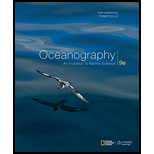
Whether the thickness of ooze has always been an accurate indication of the biological productivity of surface water in a given area.
Answer to Problem 1TC
The accretion of any kind of ooze depends on a subtle balance between the profusion of organisms at the ocean surface, the dissolution rate at after they reach the ocean bottom, and the rate of accumulation of terrigenous materials. Other factors that contribute to the accretion at the bottom are scouring currents and temperature, and pH conditions in the overlying water column through which the hard parts fall.
Explanation of Solution
An ooze is a deep-ocean sediment that contain at least 30% of biogenous material. Oozes originate from the remnants of organisms that settle on the bottom of the ocean floor. The organisms that contribute their remnants to the deep-ocean oozes are small, single-celled, migratory, plant-like organisms and the single-celled animals that feed on them. Once these organisms dies, their hard parts slowly settle down on the bottom, blends with fine-grained terrigenous clays and silts, and accumulate as ooze.
Oozes accumulate gradually, and the rate at which it accumulates is about 1 to 6 centimeters (1⁄2–21⁄2 inches) per thousand years. However, they accumulate more than 10 times as fast as deep-ocean terrigenous clays. Therefore, the accretion of any kind of ooze depends on a subtle balance between the copiousness of organisms at the ocean surface, the dissolution rate after they reach the ocean bottom, and the rate of accumulation of terrigenous materials. Other factors that contribute to the accumulation at the bottom are scouring currents and temperature, and pH conditions in the overlying water column through which the hard parts fall.
Want to see more full solutions like this?
Chapter 5 Solutions
Bundle: Oceanography: An Invitation to Marine Science, Loose-leaf Version, 9th + MindTap Oceanography, 1 term (6 months) Printed Access Card
- Prompt: Using a visual art medium of your choice, please describe or explore any environmental issue or topic of your choice. Please ensure 100% human donearrow_forwardPrompt: Using a visual art medium of your choice, please describe or explore any environmental issue or topic of your choice. Please ensure 100% human donearrow_forwardPrompt: Using an online art style of your choice, please make a meme related to the study of Geography, Environment, or Geomatics. Please ensure 100% human donearrow_forward
- Using a visual art medium of your choice, please describe or explore any environmental issue or topic of your choice.arrow_forwardUsing an online art style of your choice, please make a meme related to the study of Geography, Environment, or Geomatics.arrow_forwardidentify the 2 rocks in the photoarrow_forward
- Draw several strike-dip symbols on Figure 6.14 that would be appropriate for a dome and a basin, respectively.arrow_forwardChoose two vehicles to compare. One being a gas powered one being electric. No hybrids. With the media of your choosing compare and contrast the two vehicles emissions and pollution factors. Key words are Hydrocarbon, Carbon, Hydrogen, Asthma, Infection, Pollution, and Global warming.arrow_forwardEvaluate the advantages and disadvantages of gas and electric cars.arrow_forward
- charles darwin, what did he doarrow_forwardWhile Chapters 8 and 9 consider almost purely endogenic processes, Chapter 10 takes us further out from the center of the Earth to exogenic processes. My sister and I were out for a walk when we decided to cut through the cemetery. I could not help but wonder why the tombstones below are so different. While both tombstones are roughly the same age, the top one is made out of limestone while the bottom one is made out of granite. However, the one above looks much older due to a difference in the rate of weathering. Limestone is made out of the mineral calcite, CaCO3, calcium carbonate. Reads "1884" Dieds JOSEPH HERRING 1842-1911 JULIA HERRING 1843 NELLIE HERRING 1870-1882 Reads "1882" The tombstone in better condition here is made out of granite. Granite contains minerals such as quartz and feldspar. Both tombstones experience the same climate conditions and have been exposed to exogenic processes for the same amount of time yet they look so different! Some research into Chapter 10…arrow_forwardDiscussion Question: Tectonics, Earthquakes and Volcanism A+ The image below can also be found in your textbook. This image is not an interpretation but an actual picture of the Red Sea. This area of the world is the East African Rift Zone separating Saudi Arabia and Africa. The linear pattern is due to extensional tectonics. In other words, Africa and Saudi Arabia are moving away from each other creating tensional forces that create normal faults. The landscape features found in the area are Rift Valleys. Pretend we are on location at the East African Rift Valley. We would find Normal Faults where one side of the fault shows a rock layer dropped relative to the other layer. We would find linear mountains that formed from the valley dropping out between the normal faults. The microscale evidence we collect helps to add up to the macroscale interpretation of a divergent boundary due to tensional forces creating normal faults and rift valleys.arrow_forward
 Applications and Investigations in Earth Science ...Earth ScienceISBN:9780134746241Author:Edward J. Tarbuck, Frederick K. Lutgens, Dennis G. TasaPublisher:PEARSON
Applications and Investigations in Earth Science ...Earth ScienceISBN:9780134746241Author:Edward J. Tarbuck, Frederick K. Lutgens, Dennis G. TasaPublisher:PEARSON Exercises for Weather & Climate (9th Edition)Earth ScienceISBN:9780134041360Author:Greg CarbonePublisher:PEARSON
Exercises for Weather & Climate (9th Edition)Earth ScienceISBN:9780134041360Author:Greg CarbonePublisher:PEARSON Environmental ScienceEarth ScienceISBN:9781260153125Author:William P Cunningham Prof., Mary Ann Cunningham ProfessorPublisher:McGraw-Hill Education
Environmental ScienceEarth ScienceISBN:9781260153125Author:William P Cunningham Prof., Mary Ann Cunningham ProfessorPublisher:McGraw-Hill Education Earth Science (15th Edition)Earth ScienceISBN:9780134543536Author:Edward J. Tarbuck, Frederick K. Lutgens, Dennis G. TasaPublisher:PEARSON
Earth Science (15th Edition)Earth ScienceISBN:9780134543536Author:Edward J. Tarbuck, Frederick K. Lutgens, Dennis G. TasaPublisher:PEARSON Environmental Science (MindTap Course List)Earth ScienceISBN:9781337569613Author:G. Tyler Miller, Scott SpoolmanPublisher:Cengage Learning
Environmental Science (MindTap Course List)Earth ScienceISBN:9781337569613Author:G. Tyler Miller, Scott SpoolmanPublisher:Cengage Learning Physical GeologyEarth ScienceISBN:9781259916823Author:Plummer, Charles C., CARLSON, Diane H., Hammersley, LisaPublisher:Mcgraw-hill Education,
Physical GeologyEarth ScienceISBN:9781259916823Author:Plummer, Charles C., CARLSON, Diane H., Hammersley, LisaPublisher:Mcgraw-hill Education,





